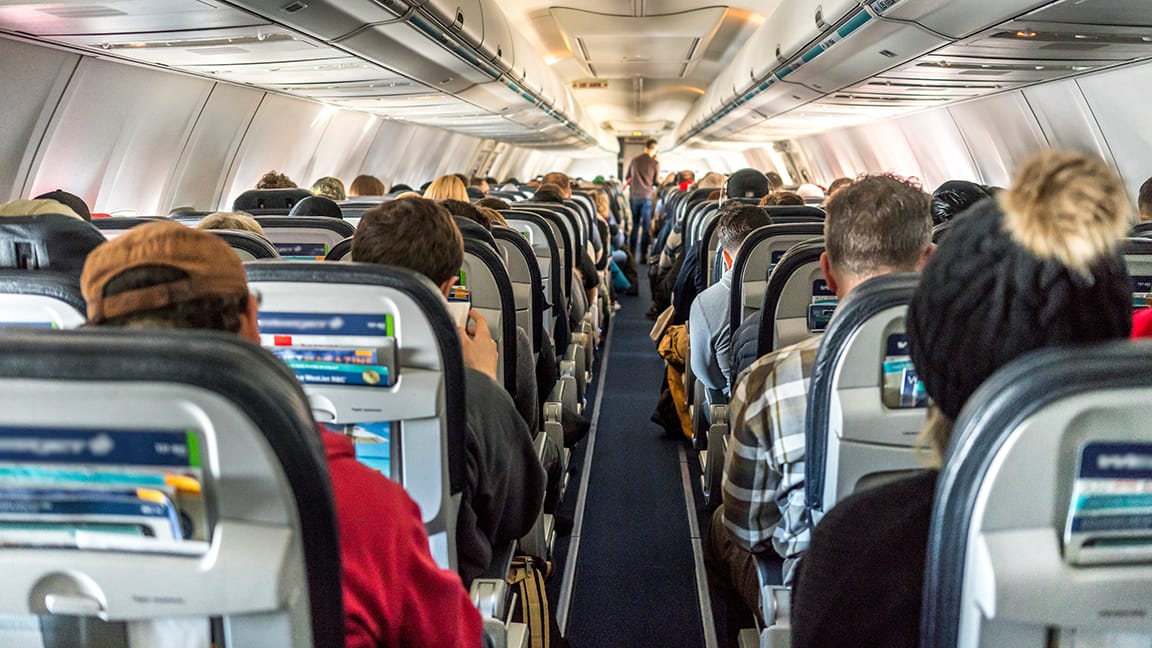Strangers on a plane
Indignity Vol. 5, No. 76

ANDY ROONEY 2.0
The Friendliest Thing You Can Do in Coach Class Is Hush Up
OVER THE WEEKEND, the discourse worked its way around to airplane behavior once again. A person posted:
Unpopular opinion: I know it's cool to wear your earbuds and carry a book while pasting a disinterested, don't-talk-to-me expression on your face, but I like to talk to the person sitting beside me on airplanes. I liked it when we were willing to be inconvenienced by strangers.
People got angry! If you desire more positive social interaction in your life, or at least more positive social-media interaction, typing out a post announcing your "unpopular opinion" is probably not the best strategy. Also "uninterested" would have been a better word choice than "disinterested."
As always when some version of this topic comes up, the surface-level dispute revolves around what people expect, or perhaps demand, from other people. Part of this is the intractable difference between extroverted personalities and introverted personalities. Some people are perfectly comfortable inside their own heads, and other people feel the need to be interacting with other people, and somehow the latter, who believe they are driven by their interest in other people, are not interested in the values or subjective needs of the people who prefer less interaction. I could say it seems like it must be a miserable life to be unable to stand your own company, and one of the chatty people could say that that's what a solipsist would say, and we would not get anywhere, while, in this speculative situation, we are all trying to get from one airport to another airport.
Different people have different values and preferences. This is why I type words into a computer for a living instead of pursuing a career in, say, sales. But in this case the chatty people have missed the essential underlying fact. "I liked it when we were willing to be inconvenienced by strangers," the poster wrote. But what really changed between the friendlier past they were imagining and the present day? Coach-class airplane rows got crammed something like 10 percent closer together, and the airlines steadily kept crowding the planes much closer to full capacity. Whether the average seat got narrower too is hotly debated; it's hard to cut seat widths enough to actually squeeze an extra seat into a row. Regardless, the contemporary air traveler is surrounded by more people, who are packed in more closely and bringing more carry-on luggage with them to try to avoid predatory baggage fees.
It's nice to give a nod and a hello to a passing soul on a country lane, but not on the corner of Broadway and 42nd Street. Strangers don't talk on airplanes in 2025 for the same reason they don't talk on the subway or on the elevator. When people are thrown into a situation in which they can no longer maintain their personal space, the polite and constructive reaction is to pretend not to notice the other people—that is, to do as little as possible to make your presence felt.
The problem is not that people are no longer willing to be inconvenienced by strangers; it's that the airlines have increased the degree of inconvenience to maximize their profits. Culturally, people in the United States prefer to talk to strangers from a distance of at least four feet. If you're talking in the middle seat in a full airplane with a 30-inch pitch between rows, there are eight other people who are confined within less than four feet of your voice.
If you want to be sociable, zip it. If that hurts your feelings, remember that the cause of your unhappiness isn't people's inhumanity to other people, but the airlines' inhumanity to everyone. Save your disdain for the real enemy, who isn't on the plane at all, or who would be up in business class if they were. Honestly, as far as the breakdown in manners under the strain of capitalism goes, it's a miracle your seatmate bothered to put in their earbuds at all.

SIDE PIECES DEP'T.

For Defector, I wrote about what a panel of leftover pundits from the Bill Clinton era have to tell the rest of us about the political moment:
What were the Clinton-era strategists arguing for, when they declared that the Democrats needed to change on the issues? On student loans, the Trump position is that instead of expanding forgiveness, the government will start garnishing wages and seizing tax refunds from people who aren't able to pay. On trans rights, the Trump position is that trans people should be forced out of the military, denied care, and outed on their passports. On immigration, Trump is deporting U.S. citizen children who have cancer.
There is neither virtue nor tactical advantage in chasing after Trump, in search of some normal and popular territory he supposedly occupies. While the Clinton veteran at the Brookings institution is admonishing Times readers that the Democrats need to acknowledge the power of the "Kamala Harris is for they/them" attack, Bill Kristol is tweeting "Stand with trans Americans." While the Democratic National Committee member is reminiscing about how "in eight years we cut 426,000 jobs from the federal government," services that keep hundreds of thousands of people alive, or millions, are collapsing because of Elon Musk's extralegal mass purge of the federal workforce.

WEATHER REVIEWS

New York City, April 27, 2025
★★★ The overnight rain had been blown completely dry. Expanding pale green leaves fluttered. Outside it was chilly enough that jeans would have been OK. A strip of brown paper, caught on a truck tire, rattled as it streamed on the wind; signage shook audibly on the signpost. Green surrounded the path down along the Loch, though the tree canopy was still sparse enough to let the blue above show through. The fence at Huddlestone Arch was open, and the Loch kept streaming right past it, on into its newly built bed. Children kicked balls around on the astroturf cover of the swimming pool in the cloudshade. Past the last little waterfall, on the final stretch into the Harlem Meer, the wind pushed the current in reverse so the water was trying to flow two ways at once, creating a solid mat of floating plant parts. Newly installed ecologically sound plantings swayed on the stretch of the Meer's shoreline where the majestic old willow was confusingly and unsettlingly absent. Two cormorants perched black and almost motionless on a rock while geese cruised around honking frantically. Further around, the water lapped against a rock outcropping that turned pale and lichen-free at the bottom, marking where it had formerly been buried in the dirt. The sun came out in time to make the dramatic skylight in the immaculate rec center suitably dazzling. Along the trail back, tiny new leaves were pushing their way out of a tall, newly severed stump, and out of the section of cut log leaning up against it.

EASY LISTENING DEP'T.
HERE IS TODAY'S Indignity Morning Podcast!

CLICK ON THIS box to find the Indignity Morning Podcast archive.


ADVICE DEP'T.
GOT SOMETHING YOU need to justify to yourself, or to the world at large? Other columnists are here to judge you, but The Sophist is here to tell you why you’re right. Direct your questions to The Sophist, at indignity@indignity.net, and get the answers you want.

SANDWICH RECIPES DEP'T.
WE PRESENT INSTRUCTIONS in aid of the assembly of a sandwich selected from Prague Chapter Book Of Recipes, compiled by Marie Paidar and Blanche Kammerer, published in 1922, and available at archive.org for the delectation of all.
CHICKEN SANDWICHES—Chop cold boiled or roast chicken, add tablespoon finely minced green pepper, moisten with salad dressing, and spread between thin slices of bread. MARIE PAIDAR.
If you decide to prepare and attempt to enjoy a sandwich inspired by this offering, be sure to send a picture to indignity@indignity.net.










